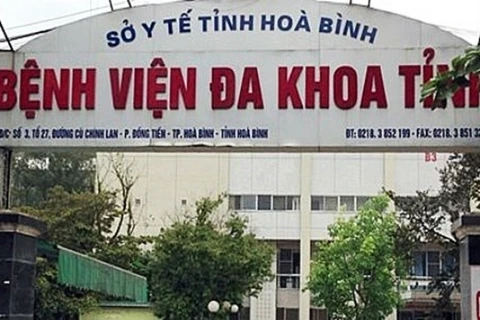 Health Minister Nguyen Thi Kim Tien visits a kidney patient who was transferred from the Hoa Binh General Hospital to the capital city’s Bach Mai Hospital after the kidney calamity on May 30 (Photo: VNA)
Health Minister Nguyen Thi Kim Tien visits a kidney patient who was transferred from the Hoa Binh General Hospital to the capital city’s Bach Mai Hospital after the kidney calamity on May 30 (Photo: VNA) Hanoi (VNA) - The level of fluoride residue found in water used for kidney dialysis in Hoa Binh General Hospital, where eight patients died recently, was high enough to cause fatalities, said medical experts.
The fluoride potency in the Hoa Binh General Hospital’s machines was strong enough to kill the patients instantly, said Professor Nguyen Gia Binh, head of the Intensive Care Department of the capital city’s Bach Mai Hospital and a member of the panel of health sector experts responsible for determining the cause of the calamity.
Sample analysis results from the Ministry of Public Security’s Criminal Science Institute show that the fluoride level in two kidney dialysis machines at the hospital was roughly 200 times higher than the permissible limit of the Association for the Advancement of Medical Instrumentation (AAMI). The other dialysis machines tested also had higher fluoride levels than permitted.
The high fluoride levels were caused by a failing RO filter system purification process, Bach Mai Hospital experts said.
Investigations revealed that Bui Manh Quoc, director of Tram Anh Water Treatment Co Ltd - the firm responsible for maintaining the dialysis machines RO filter system - used hydrochloric acid (HCI) and hydrofluoric acid (HF) to purify the system but forgot to clean the machines’ tubes, leaving chemical residues.
Quoc, together with two other suspects, including Doctor Hoang Cong Luong from the Hoa Binh General Hospital’s Department of Intensive Care, were arrested for investigation.
Doctor Luong is investigated for medical violations after allowing dialysis treatment without receiving the machines’ maintenance report beforehand.
However, Luong was released on bail on July 5 afternoon following calls from the Ministry of Health, the medical community as well as relatives of the ill-fated patients in the case.
They argue that he would not do harm to society and a detention during investigation is not necessary.
On May 29, seven out of eighteen patients undergoing kidney dialysis at the Hoa Binh General Hospital displayed symptoms of anaphylactic shock and died soon after. Another patient from the same group died on June 4 after multiple organ failure, raising the death count to eight.-VNA
VNA





















